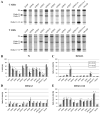Role of SFRS13A in low-density lipoprotein receptor splicing
- PMID: 20232416
- PMCID: PMC3184548
- DOI: 10.1002/humu.21244
Role of SFRS13A in low-density lipoprotein receptor splicing
Abstract
Low-density lipoprotein receptor (LDLR) is a major apolipoprotein E (APOE) receptor and thereby is critical to cholesterol homeostasis and, possibly, Alzheimer disease (AD) development. We previously identified a single nucleotide polymorphism (SNP), rs688:C>T, that modulates LDLR exon 12 splicing and is associated with cholesterol levels in premenopausal women and with Alzheimer disease in men. To gain additional insights into LDLR splicing regulation, we seek to identify splicing factors that modulate LDLR splicing efficiency. By using an in vitro minigene study, we first found that ectopic expression of SFRS3 (SRp20), SFRS13A (SRp38), SFRS13A-2 (SRp38-2), and RBMX (hnRNP G) robustly decreased LDLR splicing efficiency. Although SFRS3 and SFRS13A specifically increased the LDLR transcript lacking exon 11, SFRS13A-2 and RBMX primarily increased the LDLR isoform lacking both exons 11 and 12. When we evaluated the relationship between the expression of these splicing factors and LDLR splicing in human brain and liver specimens, we found that overall SFRS13A expression was significantly associated with LDLR splicing efficiency in vivo. We interpret these results as suggesting that SFRS13A regulates LDLR splicing efficiency and may therefore emerge as a modulator of cholesterol homeostasis.
Figures




References
-
- Ars E, Serra E, Garcia J, Kruyer H, Gaona A, Lazaro C, Estivill X. Mutations affecting mRNA splicing are the most common molecular defects in patients with neurofibromatosis type 1. Hum Mol Genet. 2000;9(2):237–47. - PubMed
-
- Caceres JF, Kornblihtt AR. Alternative splicing: multiple control mechanisms and involvement in human disease. Trends Genet. 2002;18(4):186–93. - PubMed
-
- Cao D, Fukuchi K, Wan H, Kim H, Li L. Lack of LDL receptor aggravates learning deficits and amyloid deposits in Alzheimer transgenic mice. Neurobiol Aging. 2006;27(11):1632–43. - PubMed
Publication types
MeSH terms
Substances
Grants and funding
LinkOut - more resources
Full Text Sources
Miscellaneous

